Welcome to our latest guest post in the YAAM – 2010 edition. As part of our celebration of all things YA, we invited authors from different genres to write about the books and the genres they write.
Today’s guest is Karen Healey, author of one of our favourite 2010 books, Guardian of the Dead. We invited Karen to be a part of YAAM and to write about awesome female characters.
Please give it up for Karen!
A few nights ago, I re-watched Bring It On 5: Fight To The Finish (not as good as 3, much better than 2, though without the bonus of surprise!Felicia Day*).
The Bring It On franchise, despite its varying quality, is one of my favourite movie series. I love movies about many female characters with different talents and skills, filled with young women who talk to each other and inspire each other and compete with each other and eventually trust each other to move in unison to a common goal.
Movies about cheerleaders are one of the few ways I can get these things in my film-viewing. Also, cheerleading is an awesome display of incredible athleticism, and ought to be an Olympic sport.
Bring It On 5 reminded me of two things: 1) that people often dismiss cheerleaders, in fiction and in reality, for being too girly, too perky, too bouncy. They are discounted both as athletes and as individuals, worthy of respect. And 2) that the Bring It On franchise never comes up in discussions of “strong female characters”.
That is a phrase that bugs me, by the way. Why should anyone get a pat on the back for writing strong female characters? No one gets complimented on the strength of their characterization of male characters – we assume that’s a given quality of good writing, not a special bonus. And why do so many female characters described as “strong” fit into a particular model of strength; a woman or girl who is physically strong and who can literally kick ass?
I am as guilty of this as anyone, having written a book where the female protagonist has a black belt in tae kwon do, but I am increasingly concerned at what I see as a trend of prizing physical aptitude in a very narrow field. I think we’re discounting other forms of strength in female characters as insufficiently strong, or not quite kickass enough – and therefore weak. Too feminine, too girly – as if there was anything wrong with being female, or a girl.
Of course, an abundance of kickass girls is a natural response to a long history of girls being viewed as weak and dainty, unable to fight for others or defend themselves. I certainly don’t think we should undermine the importance of telling girls that violence is not a male only domain. But there are so many ways to be strong, and while being able to break bricks with your hands is definitely one of them, I am all about embracing a wide spectrum of strength.
Which brings me to my brand new girl-crush, Teal Sherer. Teal Sherer is not a cheerleader, in fiction or real life. She is an actress, producer, sometime dancer, and activist. She’s paraplegic, and uses a wheelchair.
Teal Sherer plays the hilariously rage-filled, death-loving gamer Venom in hot internet series The Guild. She played Cathy in a production of Proof, which is only my favourite modern play of all time (about another awesome lady, a brilliant young mathematician who has trouble convincing anyone that her incredible work is actually her own). She is on the SAG Performers with Disabilities committee, campaigning for equal rights opportunities for performers with disabilities. And she works with UCP Wheels for Humanity, a non-profit that recycles over 226,000 pounds of discarded wheelchairs each year, refurbishing and distributing them to children and adults with disabilities in developing countries.
Can Teal Sherer kick literal ass? No, she can not. Does Teal Sherer kick metaphorical ass? Faster than Jackie Chan on fast forward.
And I find myself wondering; if Teal Sherer were a fictional character in a film, would people think she wasn’t sufficiently strong?
Fortunately, though the movies do not often satisfy my yen for awesome ladies being figuratively rather than literally strong, YA fiction certainly does. Not that, as a genre, it doesn’t have its problems, but within it I can find plenty of young women kicking ass without actually kicking ass. Best of all, the text supports them as awesome ladies, worthy of my admiration rather than my scorn. Here are just a few of these strong female characters:
Girl, Overboard, by Justina Chen Hedley, stars Syrah, a snowboard loving artist girl, with an occasionally bad attitude and some big family issues. After an injury that wrecked her knee and a love affair that stomped all over her heart, Syrah has to come to peace with never being able to make the big time in the snowboard world. But she discovers there are other ways for her to achieve, and other ways to be a role model, and as she embraces her own potential, she begins to heal some of the rifts in her family.
In Eighth Grade Superzero, by Olugbemisola Rhuday-Perkovich, main character Reggie is a dude.
But one of his two besties is Ruthie, a supersmart activist firecracker, always writing reports on injustices and calling her friends out on racist and sexist language. She’s interested in change for the better on a macro and micro level, and supports Reggie to run for school president because she believes in his ability to make a difference too.
Frankie, in The Disreputable History of Frankie Landau-Banks, by E. Lockhart, is another feminist badass, but she’s less out and proud about it than Ruthie. Instead of speaking up when she discovers the existence of an all-male secret society at her co-ed private boarding school, to which her boyfriend belongs, Frankie remotely infiltrates it using her smarts and inner spygirl, making the boys dance to her tune to pay them back for their exclusionary secrecy.
Cass, the heroine of A Love Story Starring My Dead Best Friend, by Emily Horner, is at the beginning of her story neither out nor particularly proud. In fact, her ex-nemesis made her first school life hell on account of her suspected sexuality. But when Cass’ best friend, theatre-loving, musical-writing Julia dies, Cass undertakes three epic quests: 1) ride her bike from Chicago to Santa Monica to scatter Julia’s ashes in the ocean. 2) help her other bereaved friends put on Julia’s last gift to them, the musical she wrote (entitled Totally Sweet Ninja Death Squad.) And, unexpectedly, 3) Make peace with her ex-nemesis, and, gradually, fall in love with her.
In Pink, by Lili Wilkinson, narrator Chloe has a girlfriend, accepting parents, a hippy dippy school – and a secret desire to wear pink. She heads to a new private school, where no one knows anything about her, and remakes herself into a pink-loving Pastel. But after the world’s must humiliating audition for the school musical, she’s slated for stage crew, and learns some much-needed lessons about being herself and standing up for the right for anyone to be who they are.
Zephyr, the vegetarian, social justice activist protagonist of Moonshine, by Alaya Johnson, proves that fighting oppression is just as vital in supernatural worlds. Zephyr is very much invested in rights for the unliving – vampires need jobs, after all, and a vampire whose only hope of an unliving wage is in crime is not a safe vampire. While Zephyr, who is descended from demon hunters, does have some training in kicking ass, it’s her go-to of last resort, not her first response, and her strength of character resides in her compassion and dedication to her causes, not in her ability to stake when necessary.
On the other hand, Mae of The Demon’s Covenant, by Sarah Rees Brennan, is absolutely untrained. Her one kill – with a pocket knife – was achieved under extreme duress, and in a world where a hidden war rages between the demon-binding magicians of the Circles and the glittering Goblin Market, Mae is dangerously normal. She has no magic, like her brother Jamie, nor any fighting ability like the enigmatic Ryves brothers. What Mae has is the ability to observe, plan, and lead, and she puts it to outstandingly good use to fight for the people she loves.
Melanie, the heroine of Hiromi Goto’s Half World, (with gorgeous illustrations by Jillian Tamaki) is also not your everyday heroine. She’s fat, friendless, poor and bullied.
When her neglectful, loving mother disappears into the Half World whence she came at the hands of the nightmarish Mr. Glueskin, Melanie is brave enough to follow her, and true enough to reentwine the Realms that had been divided, setting right a great wrong.
Gratuity Tucci, the heroine of Adam Rex’s The True Meaning of Smekday, is also on a quest to find her mother – this time, in our world, where alien creatures called the Boov have invaded the lands formerly belonging to the Noble Savages of Earth, and announced that all humans in America are to be moved to one state. Accompanied by a cat named Pig and a rogue Boov named J.Lo, Gratuity embarks on a roadtrip in a souped-up hovercar to find her mother, some allies, and a solution that might just save her species from colonization.
Benevolence, of Catherine Gilbert Murdock’s Princess Ben is not a typical fairytale princess. She’s chubby, ungracious, and far better at healing than at small talk and dancing. But when her parents and grandfather are assassinated, she’s suddenly the heir to the throne, and has to learn princessly airs and the art of diplomacy. Only developing her secret magical abilities can compensate for her misery. At least until she’s called upon to ward off invasion and tyranny, when she has to combine new skills and old to save her nation.
Wildgirl, the co-narrator of This Is Shyness, by Leanne Hall, is a tourist from saner parts of the city exploring the darkness of the suburb of Shyness, where the sun never rises. She doesn’t have martial arts skills or superpowers – unlike her guide, the interestingly hairy Wolfboy – and despite her claims, she’s not that great on the ukelele. But she does have determination and courage in spades, and she’s going to need them against the sugar-high gangs of Kidds and their mysterious controller. It’s going to be one wild night in Shyness.
So there you go – eleven awesome young ladies kicking ass without kicking a lot of ass, in contemporary fiction, in urban fantasy, in sci-fi, in high fantasy, and magical realism. Characterisation is a strength of all of these works, and so, I think we can rightly claim them to be “strong female characters”.
But if you’re also looking for young ladies kicking literal ass, may I recommend The Squad series by Jennifer Lynn Barnes? I also have a yen for cheerleaders who are secretly GIRL SPIES. Because people always underestimate cheerleaders.
And what the heck, let’s finish with a link to a vid of ladies of all ages and various abilities being awesome. Lady awesome = my most favourite thing.
* She plays a neo-punk ballet dancer turned cheerleader when funding is cut: “Most of my pieces involve anguish as a theme. Do you have any cheers about anguish?”
About the author: Karen Healey is a New Zealander living in Australia, where she is a young adult novelist and PhD candidate at the University of Melbourne. She has, no lie, a scholarship to write about superhero comics. You can visit her on her website and on her livejournal .
Thank you Karen – What a fantastic way to close YAAM!


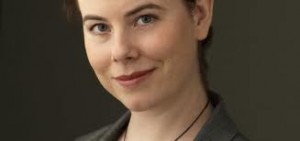
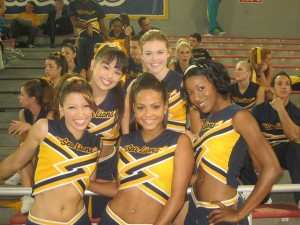
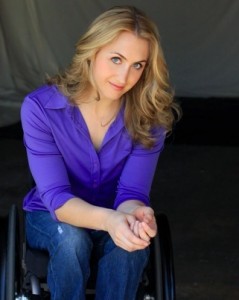
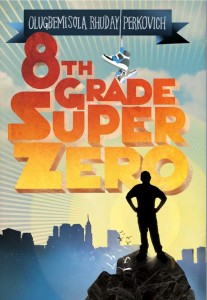
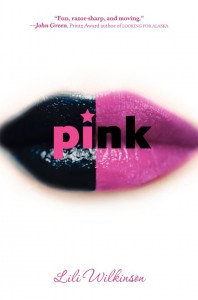
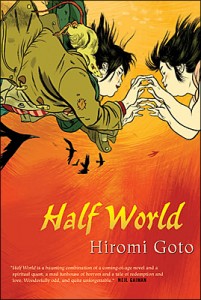
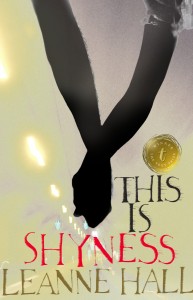










14 Comments
Karen Mahoney
August 21, 2010 at 4:33 amWhat an amazing post, thank you Karen! 🙂
I adore that video you linked to – watched it twice already.
<3
Kaz
Cindy/Blackwatch
August 21, 2010 at 5:39 amYou can say that ! Thank you for that post !(although now my TBR list has much increased…)
Celine
August 21, 2010 at 6:33 amSo great to hear someone else saying this. Male or female, a character doesn’t have to literally kick ass to kick ass. Picking up a sword/gun/rock isn’t the only way to show strength. Yes!
NTE
August 21, 2010 at 9:26 amAwesome examples, and thank you for making the point that there are a lot of different ways of kicking ass!
Gerd D.
August 21, 2010 at 1:30 pmThought provoking post, indeed, and that with a positive opening pragraph about cheerleaders, or rather a cheerleader movie (are we really already at part 5? *gosh*).
As you can tell, inspite of the fact that I always cringe a bit when cheerleaders are dismissed as being nothing but sex assets to turn on the guys, I don’t spend much time wondering about if there’s anything to them beyond being a mere sports tradition, and one that is nice to look at. Mea Culpa.
Well, I guess if we replace “strong” with being a worthy role model we already have half the answer. The other half is that self-efficent female characters still _are_ a rarity in mainstream literature, the damsel or girly type is still much too prevalent.
Great book list, I’ll have to check out some of those, to eventually redeem my erroneous assumptions regarding cheerleaders.
olugbemisola
August 22, 2010 at 2:33 amFantastic post, Karen. I’m honoured to have Ruthie mentioned, and so grateful to you for the glorious book list! the shout out to Bring It On (whoa, 5?!), And for all round Lady Awesomeness that challenges us all to re-examine our conceptions of strength and power.
April (Good Books & Wine)
August 22, 2010 at 12:26 pmOh man, I hate Venom in the Guild! After what she did when they were waiting in line for the upgrade. What a meanie. Haha, it does take acting chops to make me hate a character so much!
Great post, although I do love me some kick-ass girls, I’m sick of weak-ass heroines, by this I mean codependent ladies, NOT ladies who are physically weak.
Hayley E. Lavik
August 22, 2010 at 12:51 pmI love seeing great examples of female characters who are strong regardless of their ability to kick ass. Too many people seem to think literal ass-kicking is the only requirement (although I do enjoy a good ass-kicking character!), and that depth and strength of character isn’t required.
It reminds me of an article from Overthinking It, Why Strong Female Characters Are Bad For Women. Being able to dish out ninja skills doesn’t redeem a flat, poorly conceived character.
Rachel
August 23, 2010 at 9:12 amThis post and the video both make me really happy. I like how the video, like your post, glorifies all aspects of women being awesome, whether they’re beating up their enemies, dancing in the sunshine, or being a great mom no matter what.
Anonymous
September 12, 2010 at 8:55 pmall the books suck the only one i liked was the true meaning of smeck day s*** it
Karen Healey
September 22, 2010 at 6:37 amOh, Anonymous, I truly treasure your exceptional response to this post and do not fail to notice that the only book I mention that you admire was the only one that is by a dude.
Getting My Girly Geek On | Karen Healey
December 14, 2010 at 9:55 am[…] “That’s right!” he said. “The comic is actually written by Ms. Day and drawn by Jim Rugg, who illustrated The Plain Janes, one of your favourite YA comics. It is a prequel to the increasingly well-acted and always well-scripted web series that has awesome guest roles from Wil Wheaton and Teal Sherer, the latter of whom upon you have a giant girlcrush.” […]
author
August 11, 2012 at 4:59 amcomment